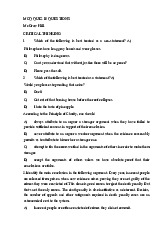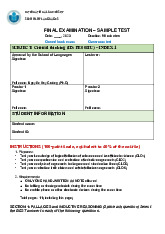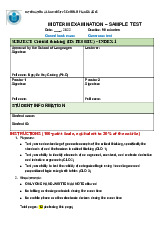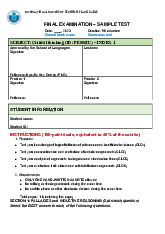



































Preview text:
CRITICAL THINKING
Course code: PE008IU (3 credits) Instructor: TRAN THANH TU Email: tttu@hcmiu.edu.vn 1 CHAPTER 2 Recognizing Arguments
Argument: some kind of quarrel or shouting match??? tttu@hcmiu.edu.vn tttu@hcmiu.edu.vn
Fact: Can be proved or disproved
Tell who, what, when, where, or how much.
Have a verifiable truth value.
Can be quantified and is specific.
Are supported by evidence. "A fact is a thing that is
occurred, to exist, or to be true." 4 tttu@hcmiu.edu.vn Opinion: Personal Belief Tend to be An opinion is a view about vague. a particular issue. Are personal It is what the person beliefs or value believes or thinks, and is judgments. not necessarily the truth. Fact Opinion
Hanoi is the capital of Vietnam. Hanoi is the best city in the world. IU is a university in Vietnam. I love studying at IU. 5 tttu@hcmiu.edu.vn 6 tttu@hcmiu.edu.vn What is an argument? A Claim Defended with Reasons.
Argument - A form of thinking in which certain
statements (reasons) are offered in support of
another statement (one conclusion).
Arguments are composed of one or more premises and one conclusion.
Premises are statements offered as reasons for accepting another statement.
A conclusion is a statement supported by reasons. 7 tttu@hcmiu.edu.vn Argument- Example
Lawyers earn a lot of money. (Premise)
I want to earn a lot of money. (Premise)
I should become a Lawyer. (Conclusion) 8 tttu@hcmiu.edu.vn 9 tttu@hcmiu.edu.vn Identifying Statements
A statement is a sentence that can be
viewed as either true or false.
Put otherwise, a statement is a sentence
that makes good grammatical sense when it
is prefaced with the words "It is true that…" or "It is false that…“. 10 tttu@hcmiu.edu.vn Identifying Statements
Here are some examples of statements:
Paris is the capital of France.
The South won the American Civil War.
Ford makes better trucks than Chevy.
Same-sex marriage should be legalized. I wish Ashley would call. I'm shocked!
Each of these sentences is a statement, because each
makes an assertion that is either true or false. 11 tttu@hcmiu.edu.vn Identifying Statements
Not all sentences are statements: How was your summer? Pick up your room! Hi!
Let's go to the ball game tonight.
None of these are statements, because none can
sensibly be preceded by the phrases "It is true that…" or "It is false that…" 12 tttu@hcmiu.edu.vn Identifying Statements
A statement can be expressed by a phrase or a dependent
clause rather than as a complete sentence.
Example: Considering Ian's near-perfect SAT scores, he
should be able to get into an Ivy League college.
For critical thinking purposes, therefore, it's important to 13 tttu@hcmiu.edu.vn Identifying Statements
Rhetorical questions should be regarded as statements.
Rhetorical questions are sentences that have the grammatical form of
questions but are meant to be understood as assertions. Example:
Alyssa, you should quit smoking. Don’t you realize
how bad that is for your health?
The point of such "questions" is not to ask for information, but to
make a positive assertion that the speaker or writer expects at least
some of his readers or listeners to agree with. For that reason,
rhetorical questions should be treated as statements rather than as questions. 14 tttu@hcmiu.edu.vn Identifying Statements
Ought imperatives should be regarded as statements.
Ought imperatives are sentences that have the grammatical
form of imperatives (i.e., commands, orders, suggestions,
proposals, exhortations) but are intended to be understood as
“ought statements,” i.e., statements that express a
judgment/advice about what ought to be done (what is
good or bad or right or wrong). Example:
Do not read beauty magazine. They will only make you feel ugly. 15 tttu@hcmiu.edu.vn Identifying Statements 1. The buses are always late. 2.
Welcome to International University! 3.
I like banana because they have no bones. 4.
When your bike reaches the gas station, make sure you turn off the engine. 5.
John greeted everybody with a smile. 16 tttu@hcmiu.edu.vn 17 tttu@hcmiu.edu.vn
Identifying Premises and Conclusions TIPS
Look for premise indicators that provide clues when premises are being offered.
Examples: because, since, for, given that, as, judging from, and seeing that.
Look for conclusion indicators that provide clues when
conclusions are being offered.
Examples: therefore, thus, hence, so, as a result,
accordingly, consequently, and which shows that. 18 tttu@hcmiu.edu.vn
Identifying Premises and Conclusions TIPS
If the passage contains no indicator words, try these two strategies:
Ask yourself, "What claim is the writer or speaker trying
to prove?" That claim will be the conclusion.
Try putting the word "therefore" before each of the
statements in turn. The statement it fits best will be the conclusion. 19 tttu@hcmiu.edu.vn
Identifying Premises and Conclusions
1. No one under eighteen-years-old can vote.
2. Jen is under eighteen-years-old. 3. Therefore, Jen cannot vote.
Arguments = one or more premises + a conclusion.
• Premises are statements offered as reasons for accepting another statement.
• A conclusion is a statement supported by reasons. 20 tttu@hcmiu.edu.vn 21 tttu@hcmiu.edu.vn What Is an Argument?
An argument is a claim defended with reasons.
More precisely, a passage is an argument if and only if:
It is a group of two or more statements.
One of those statements (the conclusion) is claimed
or intended to be supported by the other(s) (the premises). 22 tttu@hcmiu.edu.vn What Is an Argument?
Notice three important things that follow from this definition:
Arguments consist entirely of statements (sentences that it
makes sense to regard as either true or false). Questions,
commands, and other kinds of non-statements cannot be
parts of arguments (Keep in mind, however, that rhetorical
questions should be treated as statements.).
No single statement is an argument. Arguments always
consist of at least two statements.
Nothing counts as an argument unless it is claimed or
intended that one statement follows from one or more other
statements in the passage. In other words, a passage is an
argument only if the speaker or writer intends to offer
evidence or reasons why another statement should be accepted as true. tttu@hcmiu.edu.vn 23 What Is Not an Argument?
Five kinds of passages that are sometimes confused with arguments are: Reports
A statement or group of statements intended simply to
convey information about a subject. Unsupported
Is a statement or set of statements in which the speaker statements of belief
or writer expresses his or her personal opinion, but or opinions
offers no reasons or evidence to back up that opinion. Illustrations
Is a passage intended to provide examples that illustrate
or support a claim, not to provide convincing
evidence that the claim is true. Conditional
Is an if-then statement. It is an assertion that such-and- Statements
such is true if something else is true. Explanations
Is a statement or set of statements that seeks to provide
an account of why something has occurred or why something is the case. tttu@hcmiu.edu.vn 24 Report
A statement or group of statements intended
simply to convey information about a subject.
The authors are simply reporting a series of
events, not to offer reasons “why one statement
should be accepted on the basic of others”. Reports about arguments. tttu@hcmiu.edu.vn Unsupported Assertions
Is a statement or set of statements in which
the speaker or writer expresses his or her
personal opinion, but offers no reasons or
evidence to back up that opinion.
EX: I believe that it is not …. tttu@hcmiu.edu.vn Conditional Statements
If ………. then ……..
Conditional: “If I was taller, I would play basketball”
Argument: “I am tall, so I would make a good basketball player” tttu@hcmiu.edu.vn Illustrations
Is a passage intended to provide examples that
illustrate or support a claim, not to provide
convincing evidence that the claim is true.
EX: Many wildflowers are edible. For example, daisies
and day lilies are delicious in salads.
o Some arguments can look like illustrations
because they use “counterexamples”
EX: Many people think that all Star Trek fans are zit-
faced nerds. But that is not true. For example, Christian
Slater is a Star Trek fan, and he is not a zit-faced nerd. tttu@hcmiu.edu.vn Explanations
Is a statement or set of statements that seeks to
provide an account of why something has
occurred or why something is the case.
Tries to show why something is the case,
not to prove that it is the case
Titanic sank because it struck an iceberg (explanation)
Capital punishment should be abolished
because innocent people may be mistakenly executed (argument) tttu@hcmiu.edu.vn Explanations Four tests: The common-knowledge test The past-event test The author’s intent test
The principle of charity test tttu@hcmiu.edu.vn Explanations The common-knowledge test:
If the statement that the passage is seeking to prove
or explain a matter of common knowledge
the passage is probably an explanation rather than an argument.
(There’s usually little point in trying to prove
something that is already a well-known fact.)
EX: TV is very influential in society because most people watch it. tttu@hcmiu.edu.vn Explanations The past-event test:
If the statement that the passage is seeking to
prove or explain an event that occurred in the past.
the passage is probably an explanation rather
than an argument because it is much more
common and try to explain why past events
have occurred than to prove that they occurred.
EX: The U.S. entered World War II because of
Japan’s attack on Pearl Harbor tttu@hcmiu.edu.vn




